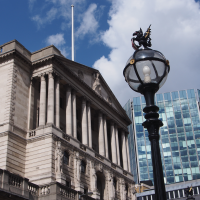
Following a 0.3% rise in both Q1 and Q2, the ONS figures was higher than the 0.3% growth which City economists had forecasted.
The official figures are released as the Bank of England is preparing to discuss whether to raise interest rates for the first time in ten years in its monetary policy meeting next week on November 2nd.
Daniel Hegarty, chief executive officer and founder of Habito, says that today’s results makes an interest rate hike next week almost certain: “For most people, the real impact of today’s GDP announcement will be felt with the Bank of England’s interest rate decision next week. That will clarify the impact of today’s results on tax, on wages on the housing market and in the now extreme likelihood of a rate rise.”
Following the higher-than-anticipated results, the pound gained almost 0.8 of a cent against the dollar to $1.32 at the time of writing, indicating that City traders are betting on a rate hike next week.
The latest figures revealed that the manufacturing industry saw the sharpest spike at a 1% rise. But the service sector — which accounts for almost 80% of the economy’s output — had the biggest overall contribution with a 0.4% growth over the quarter.
However, UK construction output shrank for the second quarter in a row, by -0.7%, although the industry still remains “well above its pre-downturn peak.”
Chancellor Philip Hammond said that they show a “successful and resilient economy which is supporting a record number of people in employment.”
A cloud of uncertainty
Earlier this month, the Chancellor acknowledged that a “cloud of uncertainty” over Brexit was “dampening” the UK economy.
Indeed, although the figures show that the UK hasn’t suffered from a Brexit induced recession as some predicted, this still could be the weakest year of growth since the financial crisis.
According to the ONS, the figures bring the estimated full year growth to 1.5% — meaning that the economy is expanding at a slower rate than in 2016, which stood at an annualised rate of 1.8%.
The eurozone’s growth rate also caught up with the UK in 2016, and has outpaced the UK so far this year. Moreover, the UK’s 0.3% growth rate in Q2 was the slowest among all of the G7 nations.
Meanwhile, inflation hit 3% this September — the highest since April 2012.
Hegarty said that the results, and the likely rate rise, paints “an uncomfortable picture for both current and prospective homeowners when combined with rising costs of living and falling disposable income. Homeowners have a short window of time to lock in current lower rates on their mortgage before the decision on 2nd November.”














